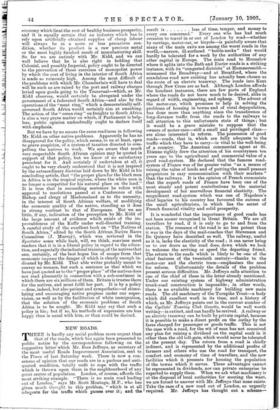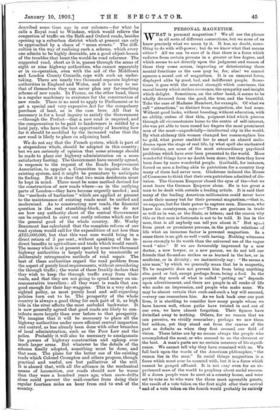NEW ROADS. T HERE is hardly any social problem more urgent
than that of the roads, which has again been presented to public• notice by the correspondence following on the suggestive letter which Mr. Rees Jeffreys, as secretary of the most useful Roads Improvement Association, sent to the Times of last Saturday week. There is now a con- sensus of opinion that our roads are in a parlous and anti- quated condition, totally unfit to cope with the traffic which is thrown upon them in the neighbourhood of any great centre of population. London, of course, affords the most striking example. " There is no main road leading out of London," says Mr. Scott Montagu, M.P., who has given much thought to this problem, " which is at all adequate for the traffic which passes over it ; and the result is loss of time, temper, and money to every one concerned." Every one who has had much occasion to travel in or out of London by road—whether by carriage, motor-car, or bicycle—is painfully aware that many of the main exits are among the worst roads in the world,—narrow, ill-surfaced " bottle-necks " that would hardly be tolerated for a week by the authorities of any other capital in Europe. The main road to Hounslow where it splits into the Bath and Exeter roads is a striking instance, with its "congested districts" at Hammersmith— misnamed the Broadway—and at Brentford, where the scandalous road now existing has actually been chosen as the route of an electric tramway. The roads into Kent through New Cross are as bad. Although London affords the handiest instances, there are few parts of England where the roads do not leave much to be desired, alike in regard of width, engineering, and upkeep. The advent of the motor-car, which promises to help in solving the problems of housing in towns and of rural depopulation, has done more than anything since the transference of long-distance traffic from the roads to the railways to call attention to this unfortunate state of things ; but it would be a grave mistake to suppose that the owners of motor-cars—still a small and privileged class— are alone interested in reform. The possession of good roads—roads, that is, which are fully adequate to the traffic which they have to carry—is vital to the well-being of a country. The American commercial agent at St. Etienne rightly drew the attention of his countrymen ten years ago to the agricultural and commercial value of a good road-system. He declared that the famous road- system of France was of far greater value " as a means of raising the value of lands and of putting the small peasant proprietors in easy communication with their markets " than the railways. It is the opinion of French economists that the superb roads of France have been one of the most steady and potent contributions to the material development of her marvellous financial elasticity. The magnificent road-system which was one of Napoleon's chief legacies to his country has favoured the success of the small agriculturists, in which lies the secret of French financial vitality and solid prosperity.
It is wonderful that the importance of good roads has not been sooner recognised in Great Britain. We are all travellers by road, if it is only to go to and from the station. The romance of the road is no less potent than it was in the days of the mail-coaches that Stevenson and De Quincey have described so well. The railway, useful as it is, lacks the elasticity of the road ; it can never bring us to our doors as the road does, down which we look to welcome the arriving or speed the departing friend. The return to the roads which is likely to be one of the chief features of the twentieth century—thanks to the motor-car and the electric tram—emphasises the need for reform. Unfortunately the details of the problem present serious difficulties. Mr. Jeffreys calls attention to one of the chief of these in the letter already mentioned. Under our existing 'system of highway administration trunk-road construction is impossible ; in other words, there is no available machinery for building new main roads. The old machinery of the Turnpike Trust—a body which did excellent work in its time, and a history of which, as Mr. Jeffreys points out in the current number of the Cyclists' Touring Club Gazette, would be well worth writine.—is extinct, and can hardly be revived. A railway or an electric tramway can be built by private capital, because it is possible to make a direct profit on the outlay by the fares charged for passenger or goods traffic. This is not the case with a road, for the wit of man has not conceived any plan for raising a dividend on the capital sunk in it other than the old toll-gate, which would never be tolerated at the present day. The return from a road is chiefly indirect, and is represented by the additional profits of farmers and others who use the road for transport, the comfort and economy of time of travellers, and the new facilities which it presents for housing the population of the towns which it serves. These advantages cannot be represented in dividends, nor can private enterprise be expected to supply them. When we ask what machinery is at the disposal of local authorities for meeting the want, we are forced to answer with Mr. Jeffreys that none exists. Take the case of a new road out of London, so urgently required. Mr. Jeffreys has thought out a scheme- described some time ago in our columns—for what he calls a Royal road to Windsor, which would relieve the congestion of traffic on the Bath and Oxford roads, besides opening up a suburban district which at present can only be approached by a chaos of " mean streets." The diffi- culties in the way of realising such a scheme, which every one admits to be highly desirable, are a good object-lesson of the troubles that beset the would-be road reformer. The suggested road, short as it is, passes through the areas of eight or nine highway authorities, who cannot separately or in co-operation, even with the aid of the Middlesex and London County Councils, cope with such an under- taking. There are nearly two thousand separate highway authorities in England and Wales, and it is easy to see that of themselves they can never plan any far-reaching scheme of new roads. In France, on the other hand, there is a regular machinery in existence for the construction of new roads. There is no need to apply to Parliament or to get a special and very expensive Act for the compulsory purchase of land, as is the case here. All that is necessary is for a local inquiry to satisfy the Government —through the Prefect—that a new road is required, and the compensation to be paid to landowners is settled by a local jury, who have the best opportunity of knowing how far it should be modified by the increased value that the new road is likely to place on adjoining land.
We do not say that the French system, which is part of a stupendous whole, should be adopted in this country; but we are seriously of opinion that some attempt should be made to place our highway administration on a more satisfactory footing. The Government have recently agreed, in response to the request of the Roads Improvement Association, to appoint a Committee to inquire into the existing system, and it might be premature to anticipate its finding. But it is clear that two main desiderata must be kept in mind. There must be some method devised for the construction of new roads where—as in the outlying parts of London—they have become urgently needed ; and the "methods of barbarism" which are applied at present to the maintenance of existing roads must be unified and modernised. As to constructing new roads, the financial question is the real stumbling-block, and we do not see how any authority short of the central Government can be expected to carry out costly reforms which are for the general good of the whole country. Mr. Worby Beaumont has calculated that the complete reform of our road system would call for the expenditure of net less than £125,000,000, but that this vast sum would bring in a direct return of 3 per cent., without speaking of the in- direct benefits to agriculture and trade which would result. The money which is at present spent by some two thousand highway authorities is largely wasted by unscientific or deliberately retrogressive methods of road repair. The best of these authorities regard the road problem from the aspect of purely local requirements, without considering the through traffic ; the worst of them frankly declare that they wish to keep the through traffic away from their roads, and that they are not going to spend money on un- remunerative travellers : all they want is roads that are good enough for their hay-waggons. This is a very short- sighted policy, as most purely local and self-regarding policies turn out to be. The prosperity of the whole country is always a good thing for each part of it, as high tide in the river affects the most secluded backwater. It is now generally agreed that good roads are likely to con- tribute more largely than ever before to that prosperity. We imagine that it will be necessary to place all the highway authorities under more efficient central inspection and control, as has already been done with other branches of local administration, such as the Poor Law and the police. Probably it will also be necessary to amalgamate the powers of highway construction and upkeep over much larger areas. But whatever be the details of the scheme finally adopted, something must be done, and that soon. The plans for the better use of the existing roads which Colonel Crompton and others propose, though practical and useful, are but palliatives of the evil. It is absurd that, with all the advance in the mechanical means of locomotion, our roads should now be worse than they were a hundred years ago, when snow-drifts alone could prevent the mail-coaches from doing their regular fourteen miles an hour from end to end of the country.







































 Previous page
Previous page